Related Research Articles

Time was a Yugoslav rock band formed in Zagreb in 1971. They were one of the most prominent acts of the 1970s Yugoslav rock scene.

Smak was a Serbian and Yugoslav band from Kragujevac. The group reached the peak of popularity in the 1970s when it was one of the most notable acts of the former Yugoslav rock scene. The band's leader, guitarist Radomir Mihailović, nicknamed Točak, is considered one of the most influential guitarists on the former Yugoslav rock scene.
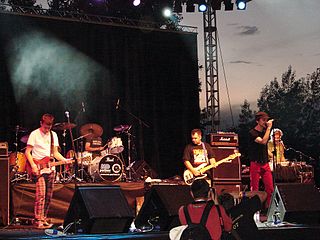
Obojeni Program is a Serbian alternative rock band from Novi Sad. The band are pioneers of the Serbian alternative rock scene. The first letters of the band's first seven studio albums form an acronym of their home town. They have performed at every Exit festival since the first in 2000, with the exception of the virtual Exit held in September 2020.

Riblja Čorba is a Serbian and former Yugoslav rock band formed in Belgrade in 1978. The band was one of the most popular and most influential acts of the Yugoslav rock scene.
Generacija 5 is a Serbian and Yugoslav rock band formed in Belgrade in 1977.

Pomaranča, signed as Orange on their English language releases, was a Slovenian and Yugoslav heavy metal band formed in Ljubljana in 1979. The band was one of the most notable acts of the Yugoslav heavy metal scene.

Labudova pesma is the eleventh studio album from Serbian and former Yugoslav rock band Riblja Čorba, released in 1992.

Priča o ljubavi obično ugnjavi is the ninth studio album from Serbian and former Yugoslav rock band Riblja Čorba, released in 1988.
Miroslav "Vicko" Milatović is a Serbian musician best known as the drummer for the Serbian and Yugoslav rock band Riblja Čorba.

Aleksandra Milošević Hagadone, better known as Slađana Milošević, was a Serbian and Yugoslav singer, songwriter, record producer, and author.

Tako was a Yugoslav progressive rock band formed in Belgrade in 1975. They were one of the most prominent acts of the Yugoslav progressive rock scene.

Videosex was a Yugoslav synth-pop band formed in Ljubljana in 1982.
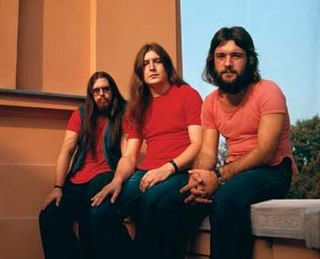
Pop Mašina was a Yugoslav progressive rock band formed in Belgrade in 1972. Pop Mašina was one of the most notable bands of the Yugoslav rock scene in the 1970s.

September was a Slovenian and Yugoslav rock band formed in Ljubljana in 1975. They were one of the most prominent acts of the 1970s Yugoslav rock scene.
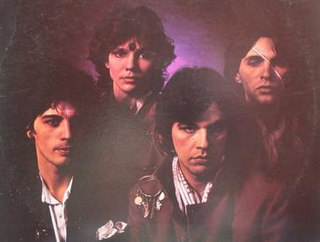
Divlji Anđeli was a Yugoslav rock band formed in Belgrade in 1982. Although short-lived, the band enjoyed large mainstream popularity during its existence, mostly thanks to their 1982 hit "Voli te tvoja zver".

Na izvoru svetlosti is the second and the last studio album by Yugoslav progressive rock band Pop Mašina, released in 1975.
Vatreni Poljubac is a Bosnian and Yugoslav hard rock/heavy metal band, formed in 1977 by composer, lyricist, vocalist, guitarist and drummer Milić Vukašinović. The band is widely considered to be regional pioneers of the heavy metal genre and one of the most important rock bands of Sarajevo and the former Yugoslavia pop-rock scene. In almost 40 years since its founding, the band has released 9 studio albums, the latest being 2011 reunion release Kad svira rock 'n' roll, two singles and several compilation albums.
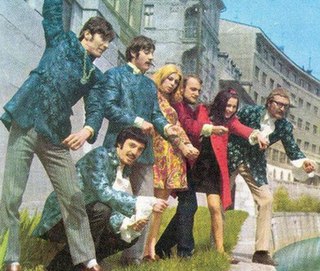
Bele Vrane were a Yugoslav rock band formed in Ljubljana in 1966.
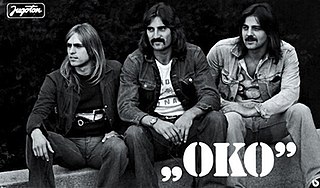
Oko was a Slovenian and Yugoslav hard/progressive rock band formed in Ljubljana in 1972. Formed and led by guitarist and vocalist Pavle Kavec, Oko was a prominent act of the Yugoslav rock scene in the 1970s.
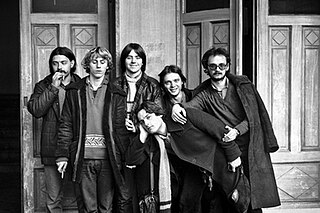
Begnagrad was a Yugoslav avant-garde/progressive rock band formed in Ljubljana in 1976. They were a prominent act of the 1970s and early 1980s Yugoslav rock scenes.
References
- 1 2 3 4 5 6 7 8 9 10 11 12 13 14 15 16 17 18 19 20 21 22 23 24 25 26 27 28 29 30 31 32 Janjatović, Petar (2024). Ex YU rock enciklopedija 1960–2023. Makart: self-released. p. 208.
- ↑ Mirković, Igor (2003). Sretno dijete. Zaprešić: Fraktura. pp. 111–112.
- ↑ "Na lepem prijazni napovedali ‘Vojno’", Rocker.si